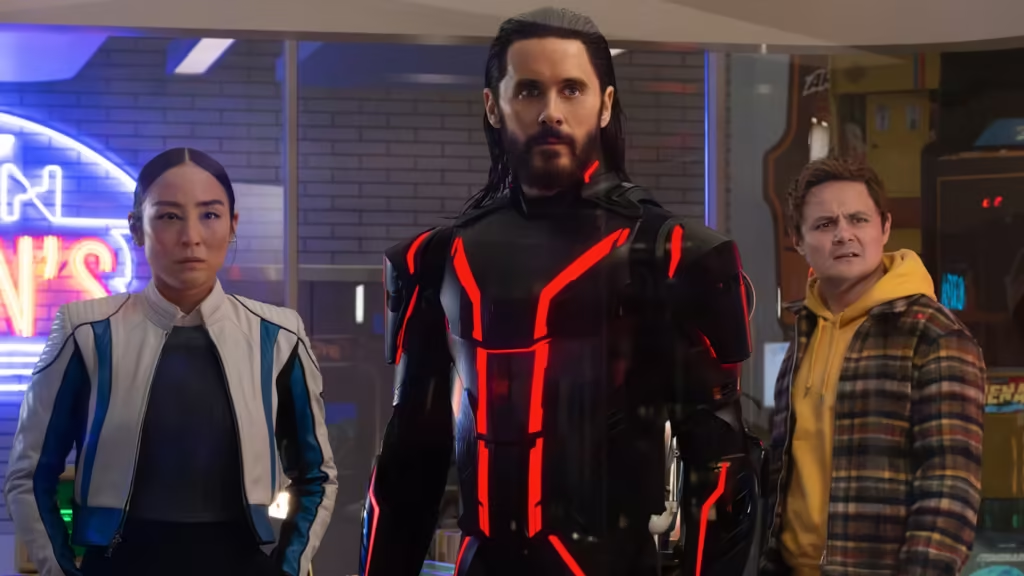The road to bring the third instalment of the iconic but underutilised Tron franchise to the screen has certainly been one fraught with chaos, with developmental woes, shelved stories and a significant switch in directors. In a move which surprised many, Disney opted to switch from a direct sequel to Tron: Legacy – with many of the sequel’s cast, director and writers initially on board – to something more akin to a soft reboot. An incredible 15 years on from Tron: Legacy, Tron: Ares emerges from the Grid. But has it been worth the wait?
Directed by Disney stelwart Joachim Rønning (Pirates of the Caribbean: Dead Men Tell No Tales, Maleficent: Mistress of Evil) Tron: Ares centres on the first digital Programs to enter the real world from the realms of The Grid. Weaponised by the latest egotistical Dillinger Systems CEO, Edward (Evan Peters) plans to sell his “100% expendable” digital super soldiers – fittingly named after Greek Gods of warfare, led by Ares (Jared Leto) and second-in-command Athena (Jodie Turner-Smith) – to the highest bidder. There’s only one snag – without Flynn’s Permanence Code – aka the film’s MacGuffin – the 3d printed fighters disintegrate (or derezz) after 28 minutes. Queue a race against time with new ENCOM CEO, Eve Kim (Greta Lee), to track down the digital relic.

What follows is a perfectly serviceable, if somewhat shallow, instalment, complete with a colourful neon sheen and impressive pulse pounding score – but if you look under the proverbial Light Cycle bonnet, a disappointingly shallow interior. The narrative choice to set the film in the real world, as opposed to the vast digital realm, is an understandable one due to the topical issues and debates surrounding AI, but in doing so, the film looses significant connective tissue to the rest of the franchise, along with the visual interest of the Grid’s retro aesthetics (bar one random sequence!) Gone are the tense light cycle races and battles set in the unique digital frontier, replaced by the disappointing cityscapes of Center City.
Furthermore, while the film borrows significant narrative elements from the proposed threequel Ascension – shifting Quorra’s proposed character arc to Ares – Leto just isn’t charismatic enough to carry the film, especially when compared to Olivia Wilde. The Morbius star is unconvincing in emoting the crucial shift in the titular character’s motives, especially when trying to sell the awkward, Depeche Mode and 80s loving AI who wants to be a real boy. This is much more of a soft reboot for the franchise than a direct sequel to the 2010 instalment, and as a result, the majority of the Legacy cast are unfortunately missing. This is particularly disappointing when you imagine what we could have had. Plus, a Tron instalment without Bruce Boxleitner just feels wrong!
It’s not all doom and gloom though. Past Lives breakout star Greta Lee is a charming addition to the franchise as she makes her blockbuster debut. She brings an empathetic and down-to-earth element to the ENCOM CEO, as Eve Kim seeks to finish the work her late sister began, acting as an excellent point-of-entry character for audiences (especially as she relatable exclaims “Oh my God” as she first enters the grid!) Jodie Turner-Smith is also impressive as the steely Athena, and you can’t help but cheer for her when she (predictably) turns against her maker. Evan Peters appears to be channeling the maniacal energy of Michael Sheen in Legacy with his hammy turn as Edward Dillinger, while the film’s writers enact the cardinal sin of underusing Gillian Anderson.
Despite the shallow and somewhat disappointing story, the long awaited soundtrack from Nine Inch Nails’ Trent Reznor and Atticus Ross is the film’s shining light, sonically speaking. The pair have quickly risen through the ranks to become some of the strongest current film composers, scoring last year’s banger of a soundtrack for Challengers, along with the ethereal Soul and the atmospheric electro of The Social Network. While Daft Punk’s genre defining score for Tron: Legacy remains iconic, this incredibly immersive pusling soundscape certainly comes very close and greatly enhances the film’s light cycle action sequences. While Rønning’s dizzying camera work veers into the realms of motion sickness at times, there’s no denying the spectacle of the headline light cycle chase, along with a lot of impressively red-heavy neon vibes!
Verdict
Featuring one of the best soundtracks of the year (KPop Demon Hunters aside!) and several immersive action sequences, Tron: Ares is undoubtedly an audiovisual treat. But there’s a surprising hollowness to the whole affair, despite a staggering 15 years of development. Fans may be left feeling more derezzed than impressed after the significant wait for this disappointing third instalment…



